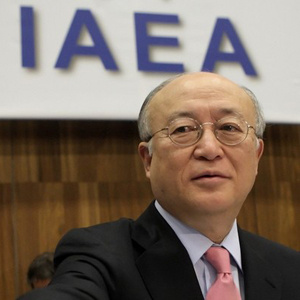The Amano Report, Catalyst for Anti-Iran Sanctions

Tomorrow, the long-awaited report of the Director-General of the International Atomic Energy Agency on the Iranian nuclear file will be released. During the last couple of weeks, there has been hue and cry by American and Israeli officials about the disclosure of the so-called military aspect of the Iranian nuclear activities in the report. In the midst of this political blitz, media sensationalism was brought to the scene to help advance the cause of chaos and turmoil.
The Israeli media started the unprecedented campaign to show that Netanyahu and Barak have been trying to obtain the support of the cabinet to attack Iran. The remarks by the Prime Minister and the Defence Minister not ruling out the possibility of attack against Iran have pointed to a possible scenario of preparing for such an action. In this context, Israeli President added his voice saying “the possibility of a military attack against Iran is now closer to being applied than the application of a diplomatic option.”
Along this line of militarism, an old propaganda tool was employed to show that Iran has intensified its efforts to reach to a point of no-return where it can easily obtain nuclear weapon capability. The Israeli paper Haaretz reported last week that, since the middle of September, the Israeli Foreign Ministry has attempted to inform officials of other countries that the opportunity to impose effective sanctions against Iran is being lost, hence the need to impose further sanctions to force Iran to stop its nuclear activities. The article published in the British paper Guardian last week, referring to the preparation of the British Defence Ministry for potential military action against Iran can be read in this context.
At this juncture when the threat of war is being more pronounced than ever, we need to find answers to some questions in order to clarify the situation.
1. The IAEA report seems to include new provisions pointing to Iran’s alleged illegal nuclear activities. IAEA Director-General has already mentioned these allegations to Iran and for its part Iran has responded to them. Why has he found it necessary to raise this matter publicly and at this time? IAEA is a technical UN body and it should always remain apolitical. Why has IAEA allowed the general trend of its report to be made public weeks before its release? Russia and China openly opposed to the content of the report a few weeks ago and Israeli officials have announced that the report would have a decisive effect on the decisions Israel would make. This by itself proves that some members have already been aware of the content and the direction of the report.
2. What has been the reason for raising the heat on the possibility of attack against Iran at this point in time? The allegation that Iran has performed some illegal nuclear activities is not new as it was mentioned few years ago. Why have American, British and Israeli governments chosen this time to talk about war? Does it have anything to do with the Russian and Chinese opposition to further sanctions against Iran at the Security Council?
3. Who benefits from instability in the region? If the US and its allies decide to take on this adventure, there will be extreme retaliation from Iran bearing in mind that Iran has already announced that it would severely retaliate any aggression against its territory. Neither Iran, nor any other country in the region and beyond will benefit from war and turmoil. The region will suffer instability, insecurity and uncertainty for a long period of time.
Arab Spring and membership of Palestine in the U.N. have attracted people’s attention in the region for quite some time. America and Israel believe that now it is time to put the attention of the international community back to the “real threat” in the Middle East, that is, the Iranian nuclear program. The U.S. and its allies will use the IAEA report for this purpose. Moreover, Israeli war propaganda against Iran is also utilized to do the same. Americans know that military adventurism against Iran will be highly costly with no international support. Even Europeans, except the U.K., have made it clear that they are against military attack. Therefore, the objective is to put pressure on all to adopt further sanctions at the Security Council.
Diplomacy and dialog should replace confrontation, threat and intimidation. The talks between Iran and 5+1 should resume as soon as possible. Both sides should welcome the Russian proposal as a basis for negotiations. People of the region are fed up with insecurity and chaos. They deserve a better and prosperous future.

